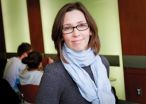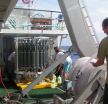(Press-News.org) This release is available in French.
Montreal, February 15, 2011 — For many women in violent relationships, leaving is not an option. Yet a woman's arsenal of defenses for resisting violence critically depends on her position within the family and community, according to new research from Concordia University published in the journal Review of Radical Political Economics.
"Women's resistance is often conceptualized only as exit, which is problematic," says study author Stephanie Paterson, a professor in the Concordia University Department of Political Science and member of the Centre for Research in Human Development. "We know that violence increases upon separation. Focusing on exit obscures the experiences of women who are unwilling and/or unable to leave," says Paterson, who is also a fellow at the Simone de Beauvoir Institute, Canada's pioneering college in the field of women's studies.
Paterson's study found that, contrary to popular theory, wealth is not a guaranteed escape from an abusive relationship. It's just one of many factors that can help a woman resist violence. Those factors can be tangible, such as access to a caring personal network. They can be intangible, such as her partner's perception of her resources, and his perception of her role within the family. If a partner perceives a woman as being in a strong position to resist, he's more likely to reconsider being violent towards her.
How battered women can push back
Paterson's study examines the different options faced by battered women – from placating an abuser to threatening to exit – and how these options can influence subsequent violence. The notion that women have some bargaining power in cases of domestic abuse, she argues, forces society to reconsider the dynamics of violence and expands the options for victims of such abuse.
For women's negotiation tactics to be effective, however, much has to change in society at both the household and public policy levels. "Not only must we provide women with adequate material resources," says Paterson, "we must also address and challenge the origins of authority within families."
"Enabling resistance is not about making women accountable, but rather challenging the state to create systems in which effective resistance is possible," she continues. "Only then will violence against women cease."
INFORMATION:
Partners in research:
This study was funded by the Ontario Graduate Scholarship from the Government of Ontario and the Legacy Scholarship from Carleton University.
About the study:
The paper, "Rethinking the Dynamics of Abusive Relationships: The Implications of Violence and Resistance for Household Bargaining," published in Review of Radical Political Economics, was authored by Stephanie Paterson of Concordia University.
Related links:
Cited study from Review of Radical Political Economics: http://rrp.sagepub.com/content/early/2010/12/13/0486613410391392
Concordia Department of Political Science: http://politicalscience.concordia.ca
Centre for Research in Human Development: http://crdh.concordia.ca
Simone de Beauvoir Institute: http://wsdb.concordia.ca
Profile on Stephanie Paterson : http://now.concordia.ca/what-we-do/research/20101025/analysing-womens-place-in-public-policy.php
Media contact:
Sylvain-Jacques Desjardins
Senior advisor, external communications
Concordia University
Phone: 514-848-2424, ext. 5068
Email: s-j.desjardins@concordia.ca
Twitter: http://twitter.com/concordianews
Concordia news: http://now.concordia.ca
How do women fend off domestic violence?
Concordia study says government has power to help women effectively resist
2011-02-16
ELSE PRESS RELEASES FROM THIS DATE:
Using chlorhexidine gluconate baths to reduce hospital-acquired infections
2011-02-16
CHG cloths more effective in reducing risk for acquiring HAIs
Study shows 64 percent decreased risk of infection from MRSA or VRE
May be beneficial for both ICU and general medical unit patients
PROVIDENCE, R.I. – A new study from Rhode Island Hospital has found a reduced risk of hospital-acquired infections (HAI) when using two percent chlorhexidine gluconate (CHG) cloths for daily bathing instead of soap and water. The study found a 64 percent decrease in the risk of acquiring an infection from either methicillin-resistant Staphylococcus aureus (MRSA) or Vancomycin-resistant ...
'Healthy' patients at high risk of cardiac death identified
2011-02-16
The way the heart responds to an early beat is predictive of cardiac death, especially for people with no conventional markers of cardiovascular disease, according to new research from Washington University School of Medicine in St. Louis.
The conventional risk factors, such as high cholesterol, smoking, diabetes and high blood pressure, account for many but not all deaths from cardiovascular causes. As a result, doctors are always searching for better ways to identify patients at risk of cardiac death.
The new research indicates that an abnormal response to an early ...
UF leads world in reconfigurable supercomputing
2011-02-16
GAINESVILLE, Fla. — University of Florida researchers say their supercomputer, named Novo-G, is the world's fastest reconfigurable supercomputer and is able to perform some important science applications faster than the Chinese supercomputer touted as the world's most powerful.
In November, the TOP500 list of the world's most powerful supercomputers, for the first time ever, named the Chinese Tianhe-1A system at the National Computer Center in Tainjin, China as No. 1.
In his state of the union speech, President Barack Obama noted, "Just recently, China became home ...
EARTH: Oil and water help US win World War II
2011-02-16
Alexandria, VA – The U.S. had two key strategic advantages over the Axis in World War II: oil and water. Although other factors played major roles in the U.S. and its allies winning the war, these two natural resources played a much larger role than recognized.
World War II was the first highly mechanized war. In the March feature "How Oil and Water Helped the U.S. Win World War II," EARTH magazine explores how the abundance of domestic US oil and water in the South and Pacific Northwest drove not only tanks and planes, but also industrial production and technological ...
Study compares balanced propofol sedation with conventional sedation for therapeutic GI endoscopic procedures
2011-02-16
OAK BROOK, Ill. – Feb. 15, 2011 – Researchers from Korea report that, compared with conventional sedation, balanced propofol sedation (BPS) using propofol in combination with midazolam and meperidine, provided higher health care provider satisfaction, better patient cooperation, and similar adverse event profiles in patients undergoing therapeutic endoscopic procedures. This is the first prospective study of BPS in direct comparison with conventional sedation. The researchers note that this study provides further evidence to support the adoption of endoscopist-directed ...
FASEB praises President Obama for increasing funding for research in his FY 2012 budget
2011-02-16
Bethesda, MD - William T. Talman, MD, President of the Federation of American Societies for Experimental Biology (FASEB), praised President Barack Obama for his continuing support for science and engineering. "The President recognizes that our future depends on research," Talman stated. In a letter to President Obama, Talman noted that his "support for this critical investment—even during a time of unprecedented budgetary constraints—will help to improve the lives of millions of people."
In his FY 2012 Budget, President Obama proposed a $745 million increase over the ...
A device enables the remote explosion of improvised land-mines
2011-02-16
Composed of diverse elements, mostly of plastic, with little metal used, improvised explosive devices are very difficult to detect. In cooperation with two colombian universities, scientists at EPFL's Electromagnetic Compatibility Laboratory have found a solution. They have developed a device enabling the remote explosion of these mines, by using the energy from their electromagnetic impulses.
This type of mine is often used by guerillas or terrorist groups in conflict zones, and is present in many regions of the world, such as Colombia, Iraq and Afghanistan. They kill ...
University of Miami scientists find new way to estimate global rainfall and track ocean pollution
2011-02-16
MIAMI – Feb 15, 2011 – A study by scientists at the University of Miami (UM) Rosenstiel School of Marine & Atmospheric Science suggests a new way to estimate how much of the ocean's pollution is falling from the sky. The new findings can help improve scientific understanding of how toxic airborne chemicals, from the burning of fossil fuels and industrial power plants emissions, are impacting the oceans globally.
By measuring Beryllium-7 (7Be) isotope concentrations in the ocean, which is found naturally throughout Earth's atmosphere, Rosenstiel School scientists David ...
Government mashups -- better contact with public authorities
2011-02-16
Potholes in the road or a park bench in need of repair – we all come across these or similar problems every now and then. If only there were a simple way of reporting them to the right department of the public administration! The latest mashup technology and mobile applications make it possible to come up with solutions.
Inspired by the UK website www.fixmystreet.com, the Fraunhofer Institute for Open Communication Systems FOKUS in Berlin is taking this approach further. Damage reports can be assigned GPS coordinates by cell phone and entered. The system then provides ...
Got a goal?: A helpful partner isn't always helpful
2011-02-16
You might think that a loving partner helps keep you on track—say, when you want to stick to your jogging or concentrate on your studies. But a new study in Psychological Science, a publication of the Association of Psychological Science, reports the opposite: Thinking about the support a significant other offers in pursuing goals can undermine the motivation to work toward those goals—and can increase procrastination before getting down to work.
The study's authors, psychological scientists Gráinne M. Fitzsimons of Duke University and Eli J. Finkel of Northwestern University, ...
LAST 30 PRESS RELEASES:
ASU researchers to lead AAAS panel on water insecurity in the United States
ASU professor Anne Stone to present at AAAS Conference in Phoenix on ancient origins of modern disease
Proposals for exploring viruses and skin as the next experimental quantum frontiers share US$30,000 science award
ASU researchers showcase scalable tech solutions for older adults living alone with cognitive decline at AAAS 2026
Scientists identify smooth regional trends in fruit fly survival strategies
Antipathy toward snakes? Your parents likely talked you into that at an early age
Sylvester Cancer Tip Sheet for Feb. 2026
Online exposure to medical misinformation concentrated among older adults
Telehealth improves access to genetic services for adult survivors of childhood cancers
Outdated mortality benchmarks risk missing early signs of famine and delay recognizing mass starvation
Newly discovered bacterium converts carbon dioxide into chemicals using electricity
Flipping and reversing mini-proteins could improve disease treatment
Scientists reveal major hidden source of atmospheric nitrogen pollution in fragile lake basin
Biochar emerges as a powerful tool for soil carbon neutrality and climate mitigation
Tiny cell messengers show big promise for safer protein and gene delivery
AMS releases statement regarding the decision to rescind EPA’s 2009 Endangerment Finding
Parents’ alcohol and drug use influences their children’s consumption, research shows
Modular assembly of chiral nitrogen-bridged rings achieved by palladium-catalyzed diastereoselective and enantioselective cascade cyclization reactions
Promoting civic engagement
AMS Science Preview: Hurricane slowdown, school snow days
Deforestation in the Amazon raises the surface temperature by 3 °C during the dry season
Model more accurately maps the impact of frost on corn crops
How did humans develop sharp vision? Lab-grown retinas show likely answer
Sour grapes? Taste, experience of sour foods depends on individual consumer
At AAAS, professor Krystal Tsosie argues the future of science must be Indigenous-led
From the lab to the living room: Decoding Parkinson’s patients movements in the real world
Research advances in porous materials, as highlighted in the 2025 Nobel Prize in Chemistry
Sally C. Morton, executive vice president of ASU Knowledge Enterprise, presents a bold and practical framework for moving research from discovery to real-world impact
Biochemical parameters in patients with diabetic nephropathy versus individuals with diabetes alone, non-diabetic nephropathy, and healthy controls
Muscular strength and mortality in women ages 63 to 99
[Press-News.org] How do women fend off domestic violence?Concordia study says government has power to help women effectively resist



